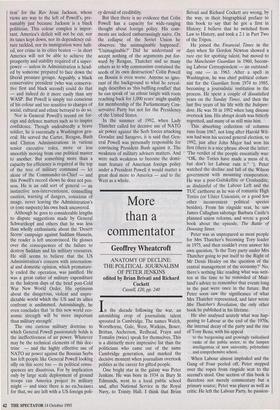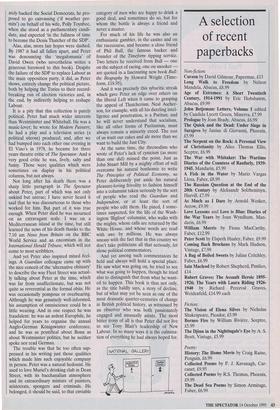More than a commentator
Geoffrey Wheatcroft
ANATOMY OF DECLINE: THE POLITICAL JOURNALISM OF PETER JENKINS edited by Brian Brivati and Richard Cockett Cassell, f20, pp. 240 In the decade following the war, an astonishing crop of journalistic talent sprouted in Cambridge. The names Welch, Worsthorne, Gale, West, Watkins, Boxer, Brittan, Ascherson, Redhead, Frayn and Tomalin (twice) speak for themselves. This is a distinctly more impressive list than the politicians who came out of the same Cambridge generation, and marked the decisive moment when journalism overtook politics as the career for gifted people.
One bright star in the galaxy was Peter Jenkins. He was born in 1934 in Bury St Edmunds, went to a local public school and, after National Service in the Royal Navy, to Trinity. Hall. I think that Brian Brivati and Richard Cockett are wrong, by the way, in their biographical preface to this book to say that he got a first in History; I believe that he switched from Law to History, and took a 2.1 in Part Two of the Tripos.
He joined the Financial Times in the days when Sir Gordon Newton showed a rare eye for spotting talent, but moved to the Manchester Guardian in 1960, becom- ing Labour Correspondent — an outstand- ing one — in 1963. After a spell in Washington, he was chief political colum- nist for the Guardian from 1974 to 1985, becoming a journalistic institution in the process. He spent a couple of dissatisfied years on the Sunday Times, and then the last five years of his life with the Indepen- dent. He was 58 in 1992 when lung disease overtook him. His abrupt death was bitterly regretted, and many of us still miss him.
This absorbing collection of columns runs from 1967, not long after Harold Wil- son had won his second general election, to 1992, just after John Major had won his first (there is a nice phrase about the latter: 'The verdict of the people essentially was: "OK, the Tories have made a mess of it, but don't let Labour ruin it." '). Peter watched the decline and fall of the Wilson government with mounting exasperation. He was a post-Gaitskellite or Croslandite, as disdainful of the Labour Left and the TUC carthorse as he was of romantic High Tories (or Ulster Unionists, or a good few other inconvenient political species besides). From his ringside seat, he saw James Callaghan sabotage Barbara Castle's planned union reforms, and wrote a good book about the episode, The Battle of Downing Street.
Peter was as unprepared as most people for Mrs Thatcher's becoming Tory leader in 1975, and then couldn't even answer his own question, 'Is the Tory party under Mrs Thatcher going to put itself to the Right of Mr Denis Healey on the question of the central management of the economy?' No, there's nothing like reading what was writ- ten at the time to be reminded of Mait- land's advice to remember that events long in the past were once in the future. But Peter soon saw the significance of what Mrs Thatcher represented, and later wrote Mrs Thatcher's Revolution, the only other book he published in his lifetime.
He also analysed acutely what was hap- pening to Labour at the end of the 1970s, the internal decay of the party and the rise of Tony Benn, with his appeal
to the burgeoning and growingly radicalised ranks of the public sector, to the lumpen intelligentsia of new university, polytechnic and comprehensive school.
When Labour almost imploded and the Gang of Four peeled off, Peter stepped over the ropes from ringside seat to the second's stool. One section of this book is therefore not merely commentary but a primary source; Peter was player as well as critic. He left the Labour Party, he passion- ately backed the Social Democrats, he pro- posed to go canvassing (`if weather per- mits') on behalf of his wife, Polly Toynbee, when she stood as a parliamentary candi- date, and expected 'in the fullness of time to become the Denis Thatcher of the SDP'.
Alas, alas, more fair hopes were dashed. By 1987 it had all fallen apart, and Peter was denouncing the 'megalomania' of David Owen (who nevertheless writes a generous foreword to this book). Despite the failure of the SDP to replace Labour as the main opposition party, it did, as Peter shows, entirely change the political picture, both by helping the Tories to their record- breaking run of election victories and, in the end, by indirectly helping to reshape Labour.
It is a pity that this collection is purely political. Peter had much wider interests than Westminster and Whitehall. He was a music-lover; he wrote for Modern Painters; he had a play and a television series (a political sitcom) produced; and, after we had bumped into each other one evening in El Vino's in 1978, he became for three years theatre critic of The Spectator. And a very good critic he was, lively, salty and funny. Those were qualities which were sometimes on display in his political columns, but not always.
Not long after his death there was a sharp little paragraph in The Spectator about Peter, part of which was not only unkind but untrue; I have never heard it said that he was discourteous to those who worked for him. But part of it was true enough. When Peter died he was mourned on an extravagant scale. I was on a Mediterranean island at the time, but still learned the news of his death thanks to the 7.10 am News from Britain on the BBC World Service and an encomium in the International Herald Tribune, which will not come to most scribblers.
And yet Peter also inspired mixed feel- ings. A Guardian colleague came up with the nice conceit of the 'alternative obituary' to describe the way Fleet Street was actual- ly talking about Peter at the time, which was far from unaffectionate, but was not quite as reverential as the formal obits. He was occasionally pompous or overbearing. Although he was genuinely well-informed, his assumption of omniscience could be a little wearing. And in one respect he was fraudulent: he was an ardent Europhile, he helped for years to organise the annual Anglo-German Konigswinter conference, and he was as pontifical about Bonn as about Westminster politics, but he neither spoke nor read German.
The trouble was that he too often sup- pressed in his writing just those qualities which made him such enjoyable company in person. Peter was a natural hedonist. He used to love Muriel's drinking club in Dean Street, with its bacchanalian atmosphere and its extraordinary mixture of painters, aristocrats, spongers and criminals. He belonged, it should be said, to that enviable category of men who are happy to drink a good deal, and sometimes do so, but for whom the bottle is always a friend and never a master.
For much of his life he was also an enthusiastic gambler, in the casino and on the racecourse, and became a close friend of Phil Bull, the famous backer and founder of the Timeform tipping service. Two letters he received from Bull — one on the subject of racing, one on snooker are quoted in a fascinating new book Bull: the Biography by Howard Wright (Time- form, £18.95). And it was precisely this sybaritic streak which gave Peter an edge over others on the liberal Left when it came to grasping the appeal of Thatcherism. Neal Ascher- son, for example, with all his dazzling intel- ligence and penetration, is a Puritan; and he will never understand that socialism, like all other forms of Puritanism, must always remain a minority creed. The rest of us want our cakes and ale more than we want to build the Just City.
At the same time, the threnodists who wrote of Peter's lack of cynicism (as more than one did) missed the point. Just as John Stuart Mill by a mighty effort of will overcame his natural bonhomie to write The Principles of Political Economy, so Peter deliberately put aside his natural pleasure-loving frivolity to fashion himself into a columnist taken seriously by the sort of people who read the Guardian and Independent, or at least the sort of people who edit them. He pined, I some- times suspected, for the life of the Wash- ington `Bigfoof columnist, who walks with the mighty, whose calls are returned by the White House, and whose words are read with awe by millions. He was always uneasy with the fact that in this country we don't take politicians all that seriously, let alone political commentators.
And yet among such commentators he held and always will hold a special place. He saw what was going on, he tried to see what was going to happen, though he tried also to distinguish that from what he want- ed to happen. This book is thus not only, as the title baldly says, a story of decline, but of what may yet be seen as one of the most dramatic quarter-centuries of change in British political history, as witnessed by an observer who was both passionately engaged and unusually astute. The most bitter irony of all is that Peter did not live to see Tony Blair's leadership of New Labour. In so many ways it is the culmina- tion of everything he had always hoped for.











































































 Previous page
Previous page